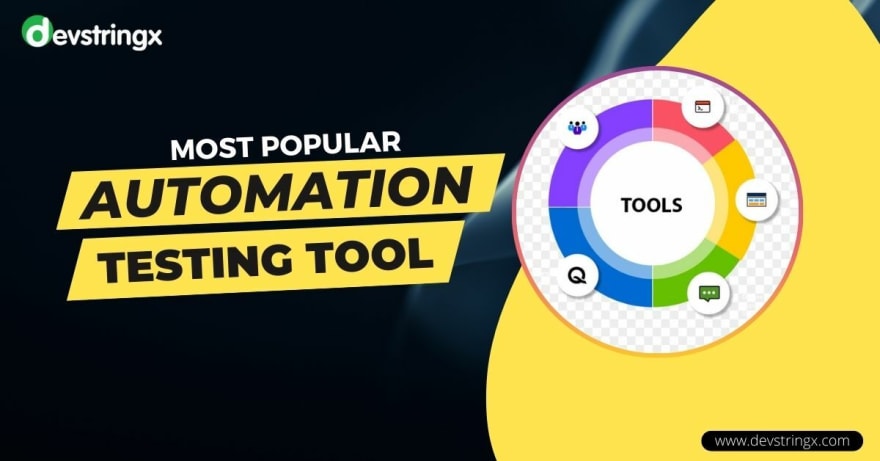In today’s fast-paced world of software development, automated testing tools have proven essential for building robust products while achieving quality fast. To meet changing demands, organizations are making great strides towards continuous integration (CI) and continuous deployment (CD), agile, and DevOps methodologies. And test automation is the essence of this aspect. The focus of automated testing tools shifts from reducing test time to improving test case coverage and effective use.
Test automation is the driving force behind the successful adoption of Agile and DevOps. However, the Global Quality Report shows that the low level of automation in testing activities is a major bottleneck for quality assurance and test development.
Automated testing with the right tools at the right time is essential to delivering high-quality products quickly. These tools can maximize the benefits of automation. Therefore, automated testing tools are an important part of the software development process.
Automated testing is essential for validating software. It also improves test execution speed and test coverage. The main advantage of automated tests is that they do not require human intervention. It will save you a lot of time. It is also error-prone and is the best solution when it comes to multilingual software.
List of Popular Tools for Automated Testing
This list includes both commercial and open-source automation testing tools. However, almost all licensing tools offer free trials that you can use before deciding which tool is best for your needs.
1. ACCELQ
ACCELQ is a cloud-based AI-powered no-code test automation platform that seamlessly automates web UI, API, mobile, and desktop. Its customers are Fortune 500 companies and global enterprises that have adopted ACCELQ to dramatically accelerate their automation goals. ACCELQ has been proven to speed up automated development by 3x and reduce maintenance by 70%, delivering cost savings of over 50% compatible with continuous delivery.
Key points:
– Visual testing, comprehensive classification, and requirement mapping
– In-sprint automation, web-mobile-API, and desktop, plug-and-play
– All-inclusive subscription, unlimited proxies, 50% off
2. Virtuoso
Virtuoso leverages AI to automate end-to-end no-code testing for even the most dynamic applications. Create functional tests using natural language programming (as easy as writing manual test scripts), unified API testing, and visual regression testing for end-to-end test coverage bout without complete code. Virtuoso’s Smart Object Recognition uses AI to inspect the DOM and find all element selectors in a simple index. This is a self-directed type.
Key Points:
– Run at scale on any device, browser, or cloud operating system
– Anyone can make API calls and log them for functional testing
– Instant test finding every visual regression from baseline
3. Katalon
Katalon is a test automation tool based on Selenium and Appium automation frameworks. This platform excels in versatility and ease of use given that you can write and reuse your UI test scripts without code. It is also easy to deploy and can be deployed on macOS, Windows, and Linux. Katalon also supports sequential and parallel execution and can perform remote and local tests.
Key Points:
– It works on Windows, macOS, and Linux and can use for various purposes
– Minimum programming skills required to use this tool
4. Selenium
Selenium is a popular open-source automation testing framework (released under Apache License 2.0). Originally developed in 2004 by JasonHugging, Selenium is still well-known and commonly used in web application testing services. It works across multiple browsers and platforms (macOS, Windows, Linux) and tests can be written in a variety of programming languages including Python, Java, C#, Scala, Groovy, Ruby, Perl, and PHP.
Key points:
– You can write complex and advanced automation scripts
– The basis for most other software testing tools
– Supports parallel test execution to reduce test execution time
5. Cucumber
Cucumber is an open-source behavior-driven development (BDD) tool. It is one of the best open-source automation testing tools and supports languages like Ruby, Java, Scala, Groovy, and more. Writing test scripts is a collaboration between testers, developers, and customers. Cucumber only supports web environments. The test code was written in plain English called Gherkin. Cucumber code can run on a variety of frameworks, including Selenium and Ruby. Cucumber focuses on the end-user experience.
Key points:
– The code can run on various frameworks like Selenium
– The test code was written in plain English called Gherkin
– Supports languages such as Ruby, Java, Scala, and Groovy
6. Appium
The Appium test automation framework is primarily use for mobile applications. It supports native, hybrid, and mobile web application automation designed for iOS and Android. Appium uses vendor-provided automation frameworks and is based on a client/server architecture. Appium is easy to install and use. As one of the best mobile automation testing tools, it has gained absolute popularity and reliability over the past few years.
Key points:
– Automate any mobile app with any testing language and framework.
– You don’t need to recompile the SDK or your app to test native apps.
– It uses the WebDriver protocol to drive iOS, Android, and even Windows apps.







Top comments (0)